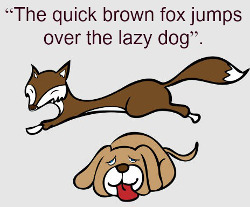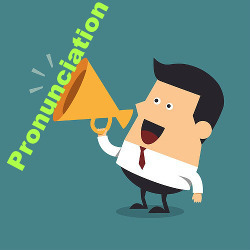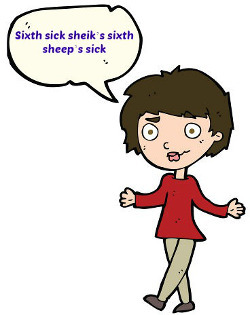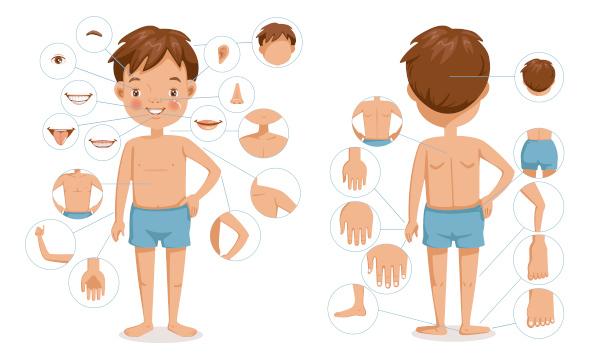There are some interesting curiosities of the English that you maybe don't know. That English is a widely spoken language everybody knows, but there are some characteristics in this language that you can't imagine. Look at some funny and interesting facts about the English language! /There are some interesting facts about English that you might not know. That English is a widely spoken language everyone knows, but there are some characteristics of this language that you can't even imagine! See some fun and interesting facts about the English language!
Check out our list!
Check out our list!
Approximately one new word is added to the English language every two hours. The dictionary grows about 4,000 words a year. / A new word is added to the English language approximately every two hours. Nearly 4,000 words are added to the dictionary each year.

Each year, English dictionaries receive about 4 million words
The word “ALMOST” has all its letters in alphabetical order. That's so cool! / The word “Almost” has all its letters in alphabetical order. That's quite nice!

The letters of "Almost" follow an alphabetical order
The word 'uncopyrightable' is the longest English word that we can spell without repeating any letters! / The word 'uncopyrightable' is the longest English word and there is no repetition of any letter!

Uncopyrightable:Longest word in English without repeating letters
Did you know what the following sentence has special? / Do you know what is special about the following sentence?
“The quick brown fox jumps over the lazy dog”.
This kind of sentence is called a 'pangram' which means that it uses every letter in the English language. / This kind of phrase is called “pangram”, which means it uses all the letters of the alphabet.

Phrase that uses the entire alphabet
See the order of appearance of each letter in the sentence:
A-30
B - 9
C-7
D - 33
E - 3 - 24 - 28
F - 14
G - 35
H - 2 - 27
I - 6
J – 17
K - 8
L - 29
M - 19
N - 13
O - 11 - 15 - 22 - 34
P – 20
Q – 4
R – 10 – 25
S - 21
T - 1 - 26
U – 5 – 18
V - 23
W - 12
X - 16
Y - 32
Z - 31
-
There isn't word in the English language that rhymes with MONTH, ORANGE, SILVER orPURPLE, which means that we will never see a poem with these words!/ There is no word in the English language that rhymes with words MONTH, ORANGE, SILVER or PURPLE, which means we will never see a poem with those words!
Do not stop now... There's more after the advertising ;)

rhymed poem in english
The most mispronounced word in the English language is 'Pronunciation'. / The least pronounced word in English is 'Pronunciation'.

The word “pronunciation” in English is the least pronounced
In the sky there is permission to talk only in English! This turn Portuguese the official language of the sky! In any country, nation, continent, if you are a pilot, you must speak in English on international flights. /In heaven there is permission to speak in English only. This makes English the official language of heaven! In any country, nation or continent, if you are a pilot, you must speak English on international flights.

The pilots' language is the English language!
In Portuguese the most difficult tongue twister is the sentence: /In English, the most difficult tongue twister is:
“Sixth sick sheik’s sixth sheep’s sick”.
Do you agree? Try to say that sentence very fast! /Do you agree? Try saying the above sentence real quick!

This is one of the most difficult tongue twisters in English
The letter "E" is the most commonly used letter in the English language. / The letter “E” is the most used letter in English.

Most English words have the letter "e"
Have you ever not why the English computer keyboard is set out with the letters in the alphabetical order? Yes? At the? Well... There is a reason for this. The first typewriters, the keys should be arranged in a way that they didn't touch, for this reason the most commonly used letters should be distant from each other. The following keyboards were made according to this same model. / Have you ever wondered why the English keyboard doesn't have the letters arranged in alphabetical order? Yea? No? Well… There's a reason for that! In early typewriters, the keys should be arranged so that they don't bump into each other, so the most commonly used letters should be far apart. The following keyboards were made according to this same model.
Another curiosity about the typewriter or keyboard is that you can type the words "proprietor", "repertoire" perpetuity "and typewriter" only with the first top row of the keyboard. / Another curiosity about the typewriter or the keyboard is that we can type the words "owner”, "repertoire", perpetuity" and typewriter” with only the top first row of the keyboard.

You can type multiple words with just the first row of the keyboard
By Janaína Mourão
Graduated in Letters - English
Would you like to reference this text in a school or academic work? Look:
MOURãO, Janaína Pereira. "Fun Facts about the English Language"; Brazil School. Available in: https://brasilescola.uol.com.br/ingles/curiosidades-sobre-lingua-inglesa.htm. Accessed on June 27, 2021.


